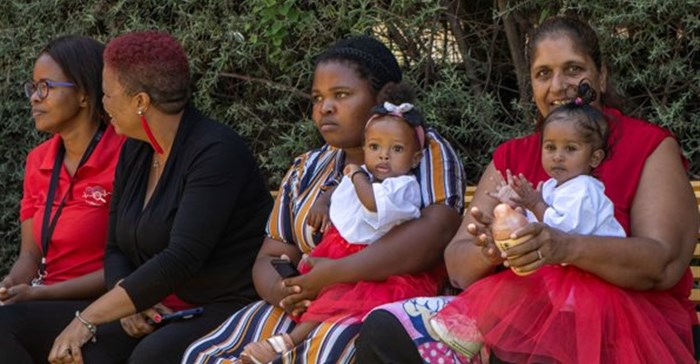
Related



The global health system can build back better after US aid cuts – here’s how
Jonathan E. Cohen 8 Aug 2025

Top stories






More news
















To support infants born with the condition, AstraZeneca has initiated a heart-warming campaign, #hearts2help, through its patient support programme Yes2Nurture.
The company is donating unique recording devices to parents of babies born with heart anomalies. The campaign was launched at a CHD awareness event at Nelson Mandela Children’s Hospital (NMCH), with a nationwide roll-out to follow.
The heart-shaped recording device, enclosed in a soft antimicrobial 10cmx10cm cushioned heart casing, can record any sound for up to 30 seconds. A father or mother’s voice, heartbeat, or even a lullaby, can be recorded and played to provide emotional comfort to the sick babies who are often separated from their parents during extended stays in the Neonatal Intensive Care Unit (NICU).
Commenting on the donation of the #hearts2help devices, Khomotso Mashilane, medical director: African Cluster, at AstraZeneca says that there’s no doubt that during NICU hospitalisations, parents feel helpless while separated from their sick children. It can be emotionally traumatising for babies and parents alike.
“We understand how difficult this can be and we are delighted that through our initiative we can help provide a level of comfort. For parents, being able to leave ‘an aspect of themselves’ with their baby, reduces their anxiety.
"Knowing they are contributing to the daily care of their sick infant and helping reduce the distress of being physically separated from them has many positive benefits for the infants,” adds Mashilane.
Expanding on this, Mashilane referenced study statements indicating that from around 18 weeks, an unborn baby starts to hear sounds in the mother’s body - like her heartbeat4.
Studies further show that it’s comforting for babies to be exposed to familiar, meaningful sounds like their mother’s heartbeat or her voice while in NICU, which has a calming effect on their heart rate, raises oxygen saturation levels, and improves vitals.
In reducing the emotional struggle during extended NICU stays, the donation of the Clop #Hearts2Help devices will be a comfort for babies and parents alike - alleviating much of their separation anxiety.
The campaign launch is linked to the start of South Africa’s Respiratory Syncytial virus (RSV) season which in South Africa, begins in February. Although RSV is a common respiratory virus that typically causes mild cold-like symptoms, it can be dangerous for CHD infants because they are at higher risk for severe respiratory infections, such as pneumonia and bronchiolitis.
If they get an infection, the effects are more severe than in most children which leads to RSV related hospitalisation.
Every year up to 3 million children under five are hospitalised with RSV and approximately 60,000 babies succumb to the illness.
RSV is an infectious disease that disproportionately impacts the youngest members of society. Campaigns like this, and CHD Awareness week, are important reminders of the need to improve public education and preventative measures in vulnerable babies.
The collaboration between AstraZeneca and NMCH aims to shift the needle when it comes to reducing infections through education and outreach initiatives, considering the risk of RSV to infants with CHD.
Although there is no vaccine for RSV - there are preventative measures that can protect CHD infants and reduce the risk of them being infected. Steps include ensuring that anyone handling the baby washes their hands regularly, avoiding exposing the infant to crowded places and other young children, keeping toys, linens and clothes clean, and no smoking in the home or around the child. Kissing the infant on their lips should also be avoided.
Preventative treatment can be discussed with a healthcare professional.
South Africa’s RSV season typically runs from February to June and it’s possible to contract the respiratory virus more than once in a season. Children with CHD are at risk for severe RSV throughout their first two years of life.
“By distributing the thought-provoking #hearts2help device - with compelling RSV disease information, we hope our campaign will not only provide comfort but also help educate parents on how to keep their CHD babies safe from infection,” concludes Mashilane.
Keeping a high-risk baby healthy needs dedication and teamwork.